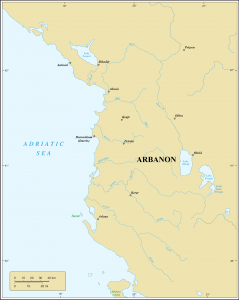As I noted in my previous post, one of the problems you face in analyzing “Machete” is the multi-pronged approach taken by its director. While obviously trying to exploit the intensified feelings surrounding the debate over what to do about illegal aliens that was engendered by the passage of SB 1070, Robert Rodriguez had obviously made this film primarily as a comic action-vengeance vehicle for his leading man, Danny Trejo.
These dual purposes are reflected in other aspects of the film as well, which only complicates matters further with a series of far-fetched plot twists. The first, and perhaps most predictable, involves Machete being enlisted by Jeff Fahey to assassinate Senator McLaughlin (DeNiro) at a widely publicized campaign rally. After the hit goes awry, forcing the title character to go on the lamb, we discover that Fahey’s character is actually Michael Booth, a close aid and advisor to the senator himself, and that the planned assassination was actually an elaborate ruse intended to bolster McLaughlin’s flagging popularity. However, let’s stop a moment and examine the eminently plausible reason that Booth’s fake persona uses for wanting to physically remove Senator McLaughlin.
After looking Machete in the eyes and gravely intoning, “for the sake of both our peoples, the senator must die,” Fahey delineates just why McLaughlin’s proposals would be so disastrous for the state of Texas. Perhaps unsurprisingly, his rationale for wanting Robert DeNiro’s character rubbed out sound almost identical to the open borders mantra regularly espoused by the editorial page of the Wall Street Journal, as well as its pro-immigration counterparts on the left. The economy would, of course, collapse, as grocers, landscapers, dishwashers, and housekeepers returned to Mexico, and Texas entered a state of unremitting stagnancy and decay without the benefits of illegal labor. Although the refutation of this dismal view of American society is left unspoken, I believe this scene provides an indictment of the immigration policies extolled by the film’s protagonists.
That’s why some of the fallacies that are repeated throughout “Machete” are so puzzling, e.g. the claim by one of the nurses for The Network-the smuggling operation run by Michelle Rodriguez’s character Luz, which aids Machete in his escape-that “most illegals aren’t given treatment at regular ERs.” Naturally, most semi-sensible people realize that everyone who is in critical condition in this country, regardless of their immigration status, is treated at emergency rooms. What’s more, non-critical, long term care has so strained the budgets of some municipal hospitals that they are threatened with insolvency, something that even the media standard-bearer for favorable treatment of illegal aliens has been forced to acknowledge. I can only assume that this was a throwaway line inserted into the script by Robert Rodriguez, because if it wasn’t that means he has a very low opinion of the intellect of his audience.
Perhaps I’m being too harsh on the director, since his aim might well have been to create a “grindhouse” film on a more epic scale. The elaborate plot twists and devices used throughout the film would lend credence to the argument that this is not in fact a pro-amnesty, anti-enforcement polemic, but simply a slick exploitation of the existing political climate. The main revelation in this respect is the discovery by Machete, through the auspices of his brother-an ordained priest portrayed by Cheech Marin-that Senator McLaughlin’s aid, Booth, is the on the payroll of his arch-nemesis, Rogelio Torrez, who is going to use the planned electrified border fence as a means of transporting his goods, i.e. illegal narcotics, into the United States.
This is another point at which Rodriguez makes an unintentionally potent point about the immigration system in the United States. As Booth is describing the contours of the fence, he summarizes the problems that are manifest with open borders policies.
An open border allows supply (drugs) to flow in too easily, it drives our prices down. A secure border limits supply.
Granted, this emotionally charged statement is being made by one of the film’s chief villains, but it has an ineluctable logic all the same. One of the reasons Americans reject open borders dogma is the subsidiary problems that flow from such a policy, including the widespread distribution of drugs. Ironically, the most evil character in this film is a Mexican drug lord, not the border “vigilantes” led by Vaughn Walker, who we later discover is in league with Torrez himself.
The discovery by Agent Sartana Rivera (Jessica Alba) that Senator McLaughlin’s allies and Torrez (Seagal) are conspiring to allow the shipment of illegal narcotics across the southern border radicalizes her, and inspires her to not only assist Machete in executing his quest for redemption/revenge but also in taking up the mantle of Luz/She, who we are led to believe was killed by Vaughn Walker’s paramilitary border patrol. Perhaps the most depressingly predictable part of the film is Rivera’s speech to a group of illegal day laborers, which is punctuated by the hackneyed cliche “we didn’t cross the border, the border crossed us.” The only problem with this trite apothegm is that there is no factual, historical basis for it.
The reason Tejano culture exists is because it is separate and distinct from Mexican culture, not because the former is simply an extension of the latter. Although the historical background behind the Texas independence movement is too complex to delve into at any length here, it must be stated that one of the chief reasons behind its success is due to the support it received from Tejanos, who were in rebellion against the central Mexican government. For a more comprehensive analyis of the divisions between these two sides I suggest you read an illuminating essay written by Professor Dr. Andrés Tijerina entitled Tejano Origins in Mexican Texas. Furthermore, some of the day laborers that Agent Rivera is exhorting to revolution are not even Mexican, but natives of Central and South American nations thousands of miles from the Texas-Mexico border, so even if we accept the fallacious notion that Mexican-Americans are indistinguishable from Mexican nationals it would be completely inapplicable to this situation.
Rivera’s exhortatory speech is followed by her abduction by Torrez-as we once again find our chief villain placing the object of Machete’s love in harm’s way-which precipitates the climactic battle between the two warring bands, Luz’s motley crew of day laborers and hospitality workers in this country illegally and the crew of border vigilantes led by Vaughn Walker. After Machete defeats Torrez, as we expected from the first scene in this film, he raises his trademark weapon in triumph, a gesture aped by his followers with their gardening implements. The final scene sees Agent Rivera offer Machete “papers” that would allow him to live in the United States legally, which elicits this exchange:
You can start over now, be a real person.
Why would I want to be a real person when I’m already a legend?
So what can we actually take away from this film, aside from lurid fantasies involving Lindsay Lohan dressed in a nun’s habit, and Robert DeNiro pretending to be an illegal alien from Mexico? That’s a good question, because as baffling as Machete is as a motion picture, it does provide a window into the confusion of open borders advocacy in general and the ambivalent mood of some segments of the American public. There are also harsh truths that it reveals about the dysfunctional system of policing immigration violations in this country, a system that is dysfunctional by design. As Michelle Rodriguez (Luz/She) explains when questioned by Agent Rivera,
How deep does your operation go?
Deep. All types, all races. Lawyers, priests, doctors, homeboys. That’s why they call it The Network.
Yet again, Rodriguez reveals an elemental truth about the reason why we’re having a discussion about amnesty, or as its advocates call it, “a pathway to citizenship,” in the first place. Namely, pressure exerted by a small elite that wants an endless supply of cheap labor and does not want to be penalized for knowingly breaking the law. Although I doubt it was the director’s intention, he unwittingly revealed the contours of the current immigration debate more adroitly than any policy analyst at a Washington think tank with his simplistic, indescribably violent, parody of a b movie.
Although Machete is not an award-winning film by any stretch of the imagination, and does not approach anything from the Mariachi Trilogy, it nonetheless illustrates some harsh truths about the deleterious consequences of open borders, and the flawed logic that this policy’s supporters employ in order to prevent them from being secured.







Recent Comments